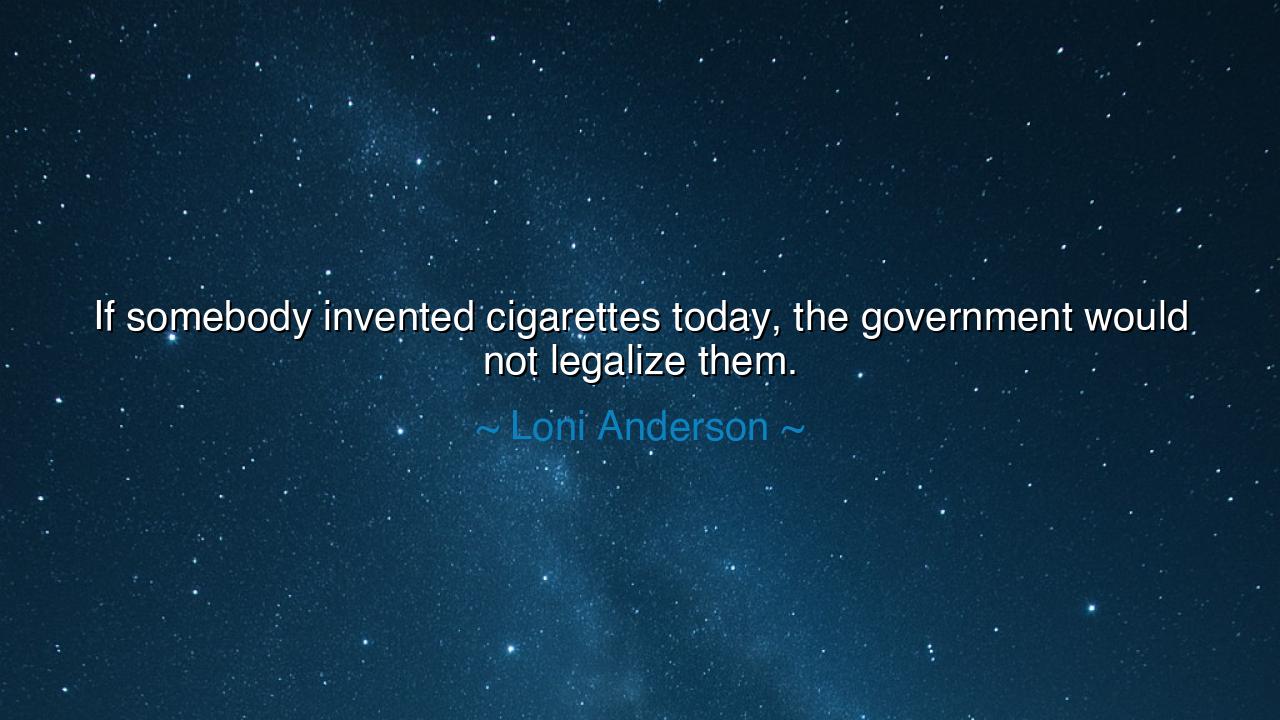
If somebody invented cigarettes today, the government would not






In the quiet wisdom of the ages, there comes a voice that looks upon the follies of humankind and sighs—not in anger, but in recognition. Loni Anderson, with simple truth wrapped in irony, once said: “If somebody invented cigarettes today, the government would not legalize them.” Her words are not merely a reflection on tobacco; they are a lament for how easily mankind becomes enslaved to its own inventions, and how what begins as pleasure may end as poison. This saying, though spoken in modern times, echoes an ancient warning—that habits, once accepted by a people, may outlast their reason, and that civilization often protects its vices long after it forgets their cost.
In this age of enlightenment and progress, we pride ourselves on knowledge, regulation, and care. Yet the story of cigarettes stands as a monument to human contradiction. Long before their dangers were known, they were celebrated as symbols of sophistication, of rebellion, of freedom itself. When the smoke first curled into the sky, men thought it noble, women thought it alluring, and the world thought it harmless. But beneath that pale cloud was a darker truth: the addiction of millions, the suffering of bodies, and the blindness of society that chose to see profit over protection. Thus, when Anderson speaks, she reminds us how strange it is that a thing so deadly could ever have been welcomed so freely.
Imagine, then, the same invention unveiled today—a slender paper tube filled with fire and poison. Would the governments of our time, who ban soft drinks too large or chemicals too strong, open their arms to such a creation? No, they would recoil; the evidence of harm would silence all applause. But because cigarettes were born in an age less wise, they were woven into culture, guarded by tradition and commerce, too deeply to be undone. So it is that humanity often finds itself chained not by the evils it discovers, but by the customs it refuses to abandon.
The ancients, too, knew this tragedy of habit. Consider the story of Rome and lead. The Romans, in their genius, built aqueducts and pipes from lead, believing it noble and everlasting. Their engineers praised its strength; their poets sang of its purity. But unseen, it poisoned their water, and in time, their people. The empire that conquered the world was slowly undone by what it loved and trusted most. So too are we—ever inventing, ever advancing, yet slow to recognize that progress without wisdom can be the seed of decline. Cigarettes, like Rome’s lead, stand as a parable of unintended ruin.
Anderson’s words, though spoken with modern simplicity, carry an eternal weight. She calls us to discernment—to judge the fruits of our creations before they ripen into regret. In every age, new “cigarettes” are born: technologies that seduce before they are understood, comforts that numb before they enlighten. The wise must ask not only “Can we make this?” but “Should we?” For every generation inherits the vices of the last, unless it has the courage to look upon them with honest eyes.
Yet her message is not one of condemnation, but of awakening. We cannot change the past, but we can shape what is yet to be invented. If the rulers of today would not legalize cigarettes anew, then let the people of today not legalize in their hearts the next addiction disguised as freedom. Let us question what we consume—not only with our mouths, but with our minds, our time, and our spirits. For addiction is not only to smoke, but to comfort, to distraction, to ease. And every age has its own form of smoke that blinds the soul.
So, my children of the present age, take heed. Learn from the folly of those before you. Be skeptical of the pleasures that come cheap and the habits that come easily. The true strength of a society is not measured by what it can permit, but by what it can resist. Let your lives be governed not by impulse, but by insight. If today’s world would not legalize the old poisons, let tomorrow’s world not create new ones.
For wisdom, once spoken, is like a breath of clean air—it clears the mind, sharpens the senses, and restores the soul. And in that clear breath, we may yet find the strength to refuse what once was accepted, and to build a future guided not by smoke, but by clarity.






AAdministratorAdministrator
Welcome, honored guests. Please leave a comment, we will respond soon